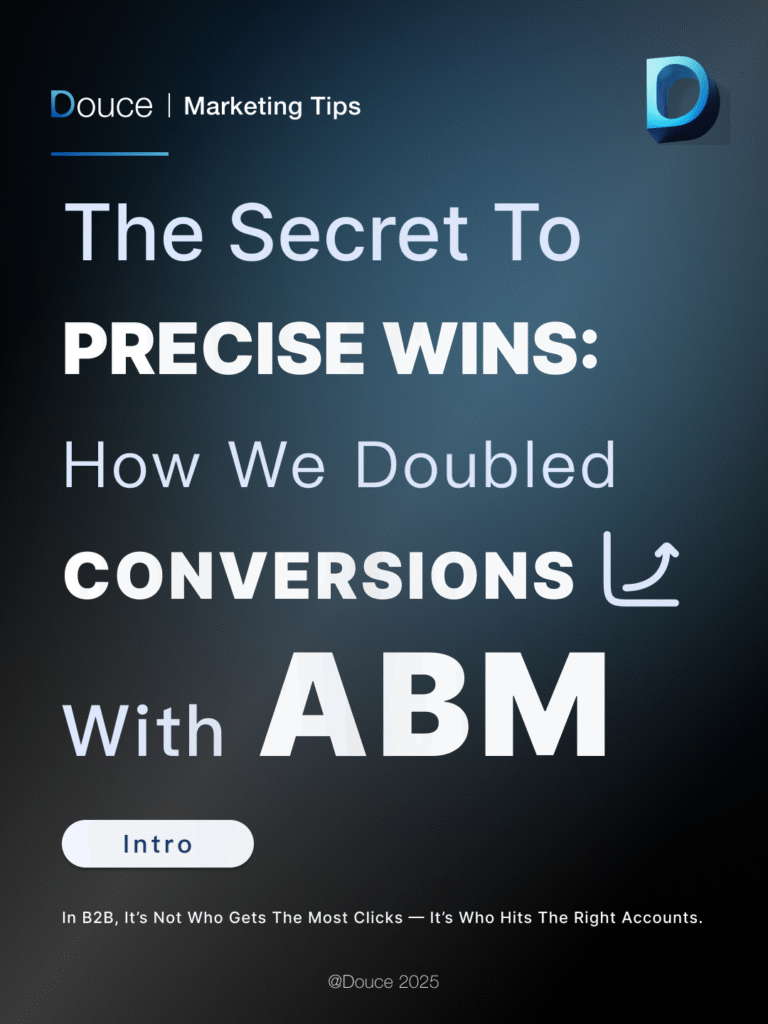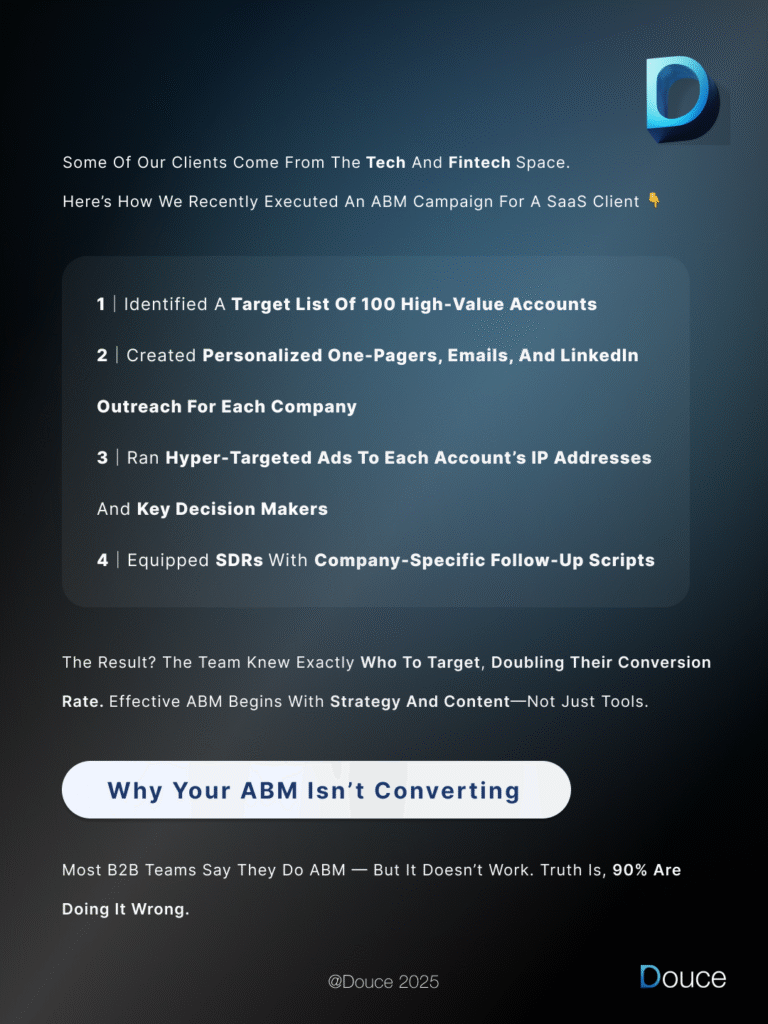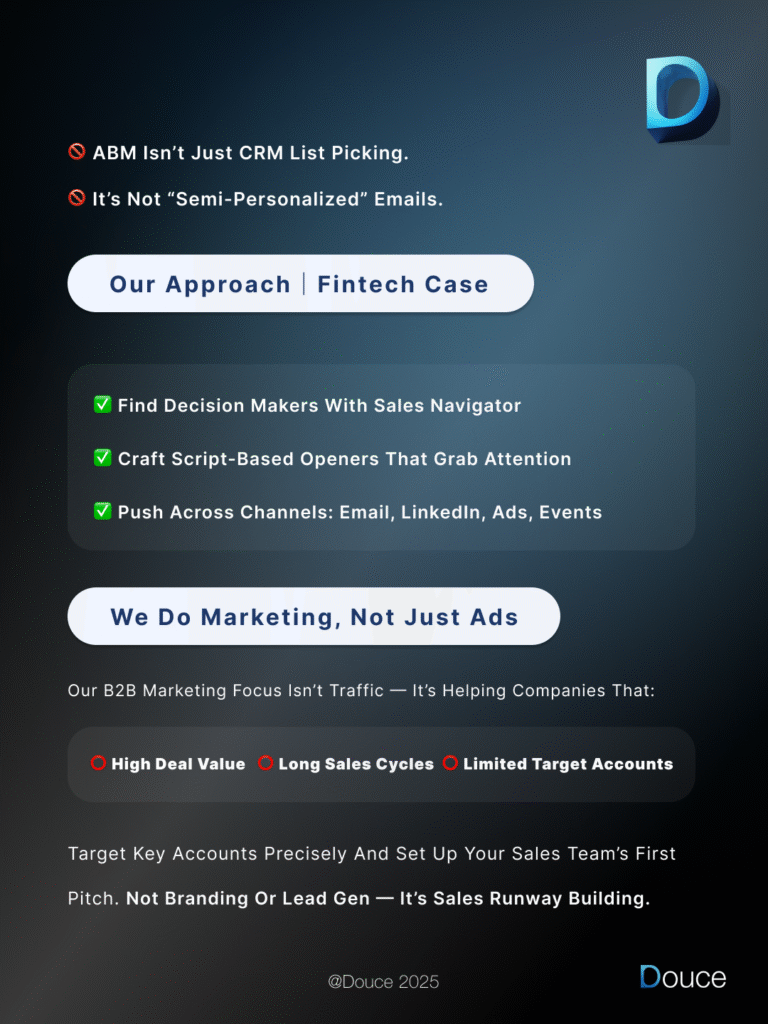Why ABM (Account-Based Marketing) Is the Ultimate Growth Strategy for B2B Companies
Douce | Blog
In the B2B world, success doesn’t come from broad exposure—it comes from reaching the right accounts with the right message, at the right time.
Yet many businesses still run ads like they’re selling skincare or supplements—wasting budget, misfiring content, and chasing KPIs that don’t convert.
Enter Account-Based Marketing (ABM): a more precise, strategic, and scalable approach to B2B growth.
What Is ABM, Really?
ABM stands for Account-Based Marketing—a strategy that flips the traditional funnel upside down.
Instead of casting a wide net, ABM identifies high-value target accounts and builds custom campaigns for each.
Think of it as:
🎯 Choosing your fish before you cast the line
🧠 Focusing on quality over quantity
✍️ Creating personalized messaging that feels 1:1—not mass-produced
ABM doesn’t aim to reach everyone. It aims to convert the few who matter most.
Why Traditional Marketing Falls Short for B2B
Most B2B companies face challenges like:
Long sales cycles
High CAC (Customer Acquisition Cost)
Complex buying committees
Limited pool of real prospects
In this context, traditional inbound or content marketing often fails to deliver. Generic blog posts and social ads may generate impressions, but rarely reach the decision-makers that matter.
What ABM Looks Like in Practice
Here’s how a solid ABM strategy works:
Identify 50–100 dream accounts with real buying potential
Create personalized landing pages, emails, and content for each segment
Activate paid media, outbound SDR outreach, and email—all aligned to those accounts
Track engagement by account, and optimize continuously
Collaborate closely between marketing and sales for full-funnel conversion
When the decision-maker at a target company sees your email, they think:
“This isn’t just another ad—this is written for me.”
Common ABM Myths
“ABM is expensive.”
❌ Not true—wasted ad spend is expensive. ABM helps reduce CAC by focusing only on real opportunities.“We don’t have enough resources for ABM.”
❌ Even lean teams can start small with pilot campaigns targeting 10–20 accounts and scale from there.“We already do email marketing and paid ads.”
❌ ABM isn’t about tools—it’s about coordination, personalization, and strategic alignment.
Why ABM Works—Especially for B2B
If your business has:
High-ticket products
Multi-stakeholder buying processes
A clear ICP (Ideal Customer Profile)
Limited but valuable market size
Then ABM isn’t optional—it’s essential.
It brings focus, clarity, and higher conversion rates by aligning marketing, sales, and content efforts around accounts that matter.
Final Thoughts: You Don’t Need a Bigger Budget—You Need a Better Strategy
Many teams think growth is about producing more content or spending more on ads.
In reality, it’s about spending smarter, targeting better, and executing consistently.
ABM doesn’t replace your marketing—it upgrades it.
It brings discipline, intent, and conversion-driven focus into your funnel.
Ready to Try ABM for Your Brand?
If you’re building a B2B growth engine and want to explore how ABM can work in your space—let’s talk.
We’ll help you:
Define your Dream 100 list
Build messaging that resonates
Design a campaign system that converts
👉 Growth starts by targeting the right people—intelligently.




